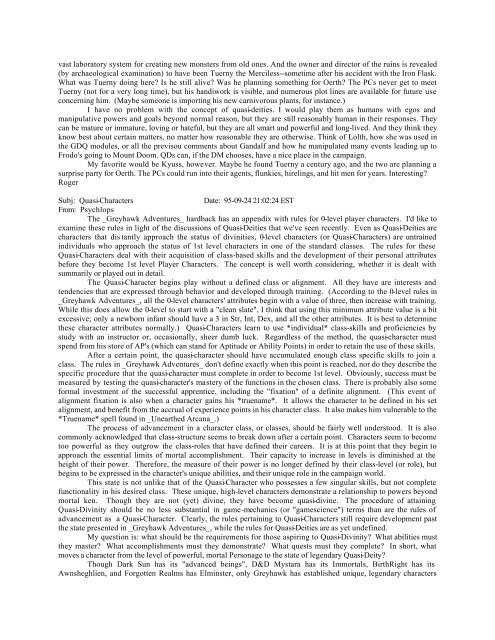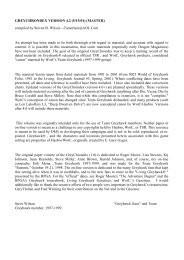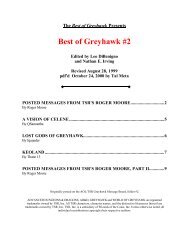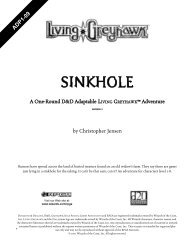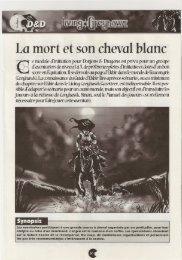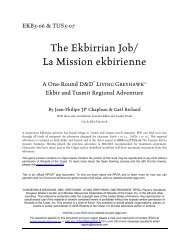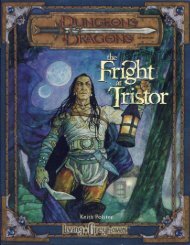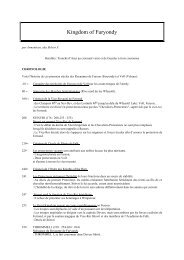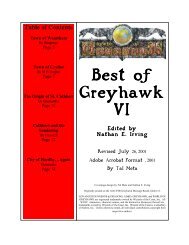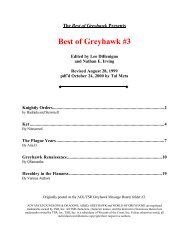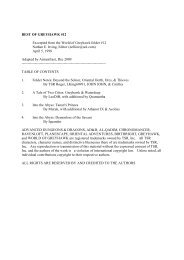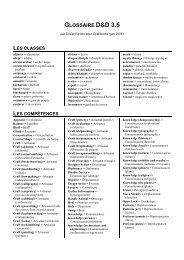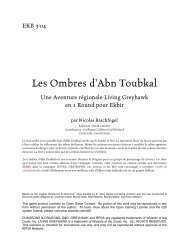Best of Greyhawk VII - Le Monde de Greyhawk
Best of Greyhawk VII - Le Monde de Greyhawk
Best of Greyhawk VII - Le Monde de Greyhawk
- No tags were found...
Create successful ePaper yourself
Turn your PDF publications into a flip-book with our unique Google optimized e-Paper software.
vast laboratory system for creating new monsters from old ones. And the owner and director <strong>of</strong> the ruins is revealed(by archaeological examination) to have been Tuerny the Merciless--sometime after his acci<strong>de</strong>nt with the Iron Flask.What was Tuerny doing here? Is he still alive? Was he planning something for Oerth? The PCs never get to meetTuerny (not for a very long time), but his handiwork is visible, and numerous plot lines are available for future useconcerning him. (Maybe someone is importing his new carnivorous plants, for instance.)I have no problem with the concept <strong>of</strong> quasi-<strong>de</strong>ities. I would play them as humans with egos andmanipulative powers and goals beyond normal reason, but they are still reasonably human in their responses. Theycan be mature or immature, loving or hateful, but they are all smart and powerful and long-lived. And they think theyknow best about certain matters, no matter how reasonable they are otherwise. Think <strong>of</strong> Lolth, how she was used inthe GDQ modules, or all the previsou comments about Gandalf and how he manipulated many events leading up toFrodo's going to Mount Doom. QDs can, if the DM chooses, have a nice place in the campaign.My favorite would be Kyuss, however. Maybe he found Tuerny a century ago, and the two are planning asurprise party for Oerth. The PCs could run into their agents, flunkies, hirelings, and hit men for years. Interesting?RogerSubj: Quasi-CharactersDate: 95-09-24 21:02:24 ESTFrom: PsychlopsThe _<strong>Greyhawk</strong> Adventures_ hardback has an appendix with rules for 0-level player characters. I'd like toexamine these rules in light <strong>of</strong> the discussions <strong>of</strong> Quasi-Deities that we've seen recently. Even as Quasi-Deities arecharacters that dis tantly approach the status <strong>of</strong> divinities, 0-level characters (or Quasi-Characters) are untrainedindividuals who approach the status <strong>of</strong> 1st level characters in one <strong>of</strong> the standard classes. The rules for theseQuasi-Characters <strong>de</strong>al with their acquisition <strong>of</strong> class-based skills and the <strong>de</strong>velopment <strong>of</strong> their personal attributesbefore they become 1st level Player Characters. The concept is well worth consi<strong>de</strong>ring, whether it is <strong>de</strong>alt withsummarily or played out in <strong>de</strong>tail.The Quasi-Character begins play without a <strong>de</strong>fined class or alignment. All they have are interests andten<strong>de</strong>ncies that are expressed through behavior and <strong>de</strong>veloped through training. (According to the 0-level rules in_<strong>Greyhawk</strong> Adventures_, all the 0-level characters' attributes begin with a value <strong>of</strong> three, then increase with training.While this does allow the 0-level to start with a "clean slate", I think that using this minimum attribute value is a bitexcessive; only a newborn infant should have a 3 in Str, Int, Dex, and all the other attributes. It is best to <strong>de</strong>terminethese character attributes normally.) Quasi-Characters learn to use *individual* class-skills and pr<strong>of</strong>iciencies bystudy with an instructor or, occasionally, sheer dumb luck. Regardless <strong>of</strong> the method, the quasi-character mustspend from his store <strong>of</strong> AP's (which can stand for Aptitu<strong>de</strong> or Ability Points) in or<strong>de</strong>r to retain the use <strong>of</strong> these skills.After a certain point, the quasi-character should have accumulated enough class specific skills to join aclass. The rules in _<strong>Greyhawk</strong> Adventures_ don't <strong>de</strong>fine exactly when this point is reached, nor do they <strong>de</strong>scribe thespecific procedure that the quasi-character must complete in or<strong>de</strong>r to become 1st level. Obviously, success must bemeasured by testing the quasi-character's mastery <strong>of</strong> the functions in the chosen class. There is probably also someformal investment <strong>of</strong> the successful apprentice, including the "fixation" <strong>of</strong> a <strong>de</strong>finite alignment. (This event <strong>of</strong>alignment fixation is also when a character gains his *truename*. It allows the character to be <strong>de</strong>fined in his setalignment, and benefit from the accrual <strong>of</strong> experience points in his character class. It also makes him vulnerable to the*Truename* spell found in _Unearthed Arcana_.)The process <strong>of</strong> advancement in a character class, or classes, should be fairly well un<strong>de</strong>rstood. It is alsocommonly acknowledged that class-structure seems to break down after a certain point. Characters seem to becometoo powerful as they outgrow the class-roles that have <strong>de</strong>fined their careers. It is at this point that they begin toapproach the essential limits <strong>of</strong> mortal accomplishment. Their capacity to increase in levels is diminished at theheight <strong>of</strong> their power. Therefore, the measure <strong>of</strong> their power is no longer <strong>de</strong>fined by their class-level (or role), butbegins to be expressed in the character's unique abilities, and their unique role in the campaign world.This state is not unlike that <strong>of</strong> the Quasi-Character who possesses a few singular skills, but not completefunctionality in his <strong>de</strong>sired class. These unique, high-level characters <strong>de</strong>monstrate a relationship to powers beyondmortal ken. Though they are not (yet) divine, they have become quasi-divine. The procedure <strong>of</strong> attainingQuasi-Divinity should be no less substantial in game-mechanics (or "gamescience") terms than are the rules <strong>of</strong>advancement as a Quasi-Character. Clearly, the rules pertaining to Quasi-Characters still require <strong>de</strong>velopment pastthe state presented in _<strong>Greyhawk</strong> Adventures_, while the rules for Quasi-Deities are as yet un<strong>de</strong>fined.My question is: what should be the requirements for those aspiring to Quasi-Divinity? What abilities mustthey master? What accomplishments must they <strong>de</strong>monstrate? What quests must they complete? In short, whatmoves a character from the level <strong>of</strong> powerful, mortal Personage to the state <strong>of</strong> legendary Quasi-Deity?Though Dark Sun has its "advanced beings", D&D Mystara has its Immortals, BirthRight has itsAwnsheghlien, and Forgotten Realms has Elminster, only <strong>Greyhawk</strong> has established unique, legendary characters


